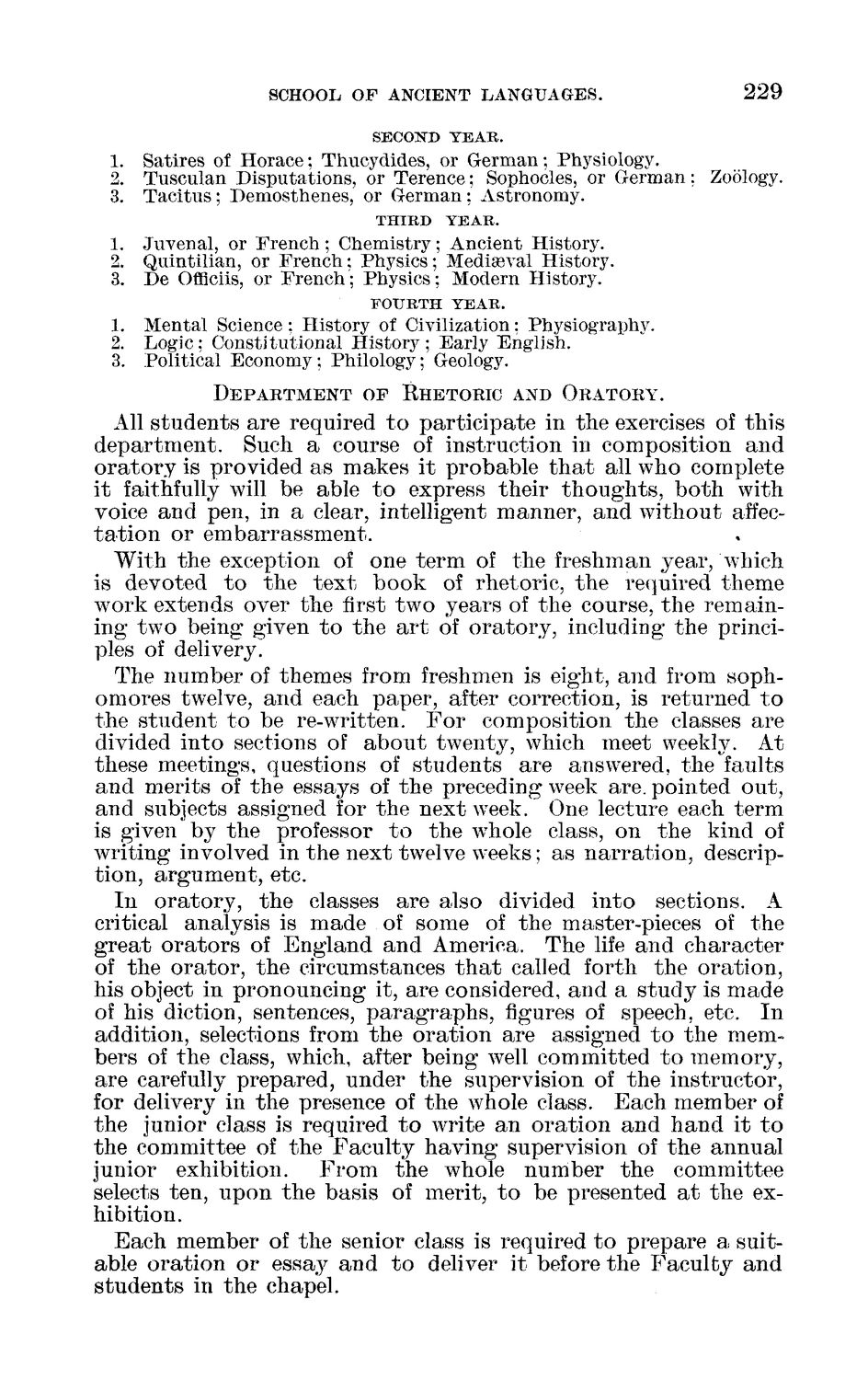| |
| |
Caption: Board of Trustees Minutes - 1890
This is a reduced-resolution page image for fast online browsing.

EXTRACTED TEXT FROM PAGE:
SCHOOL O F ANCIENT LANGUAGES. SECOND Y E A R . 229 1. Satires of Horace; Thucydides, or German; Physiology. 2. Tusculan Disputations, or Terence; Sophocles, or German; Zoology. 3. Tacitus ; Demosthenes, or German ; Astronomy. THIRD YEAR. 1. Juvenal, or French ; Chemistry; Ancient History. 2. Quintilian, or French; Physics; Mediaeval History. 3. De Officiis, or French; Physics; Modern History. FOURTH YEAR. 1. Mental Science ; History of Civilization; Physiography. 2. Logic ; Constitutional History ; Early English. 3. Political Economy; Philology; Geology. DEPARTMENT OF KHETORIC AND ORATORY. All students are required t o participate in t h e exercises of this department. Such a course of instruction in composition a n d o r a t o r y is provided as makes i t probable t h a t all who complete it faithfully will be able t o express their t h o u g h t s , b o t h with voice and pen, in a clear, intelligent manner, a n d without affect a t i o n or embarrassment. With t h e exception of one term of t h e freshman year, which is devoted t o t h e t e x t book of rhetoric, t h e required theme work extends over the first t w o years of t h e course, t h e remaining t w o being given t o t h e a r t of o r a t o r y , including t h e principles of delivery. The number of themes from freshmen is eight, a n d from sophomores twelve, a n d each paper, after correction, is returned t o the student t o be re-written. F o r composition t h e classes are divided into sections of a b o u t twenty, which meet weekly. At these meetings, questions of students are answered, t h e faults and merits of t h e essays of t h e preceding wTeek are. pointed o u t , and subjects assigned for t h e next week. One lecture each term is given by t h e professor t o t h e whole class, on t h e kind of writing involved in t h e next twelve weeks; a s n a r r a t i o n , description, argument, etc. In o r a t o r y , t h e classes a r e also divided i n t o sections. A critical analysis is made of some of t h e master-pieces of t h e g r e a t o r a t o r s of England a n d America. The life a n d character of t h e o r a t o r , t h e circumstances t h a t called forth t h e oration, his object in pronouncing it, are considered, a n d a s t u d y is made of his diction, sentences, p a r a g r a p h s , figures of speech, etc. I n addition, selections from t h e o r a t i o n are assigned t o t h e members of t h e class, which, after being well committed t o memory, are carefully prepared, under the supervision of t h e instructor, for delivery in t h e presence of t h e whole class. Each member of the junior class is required t o write a n o r a t i o n a n d h a n d it t o the committee of t h e F a c u l t y h a v i n g supervision of t h e annual junior exhibition. F r o m t h e whole number t h e committee selects ten, upon t h e basis of merit, t o be presented a t t h e exhibition. Each member of t h e senior class is required t o prepare a suitable oration or essay a n d t o deliver it before t h e F a c u l t y a n d students in t h e chapel.
| |